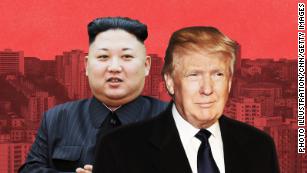
Singapore's foreign minister tweets photo of Kim Jong Un's city tour
From CNN’s Sarah Faidell and Yoonjung Seo
Singapore’s Foreign Minister Vivian Balakrishnan tweeted a photo with Kim Jong Un on an apparent tour of the city.
The tweet shows Balakrishnan and Kim Jong Un smiling at the camera and reads: “#jalanjalan #guesswhere?”
“Jalan-jalan” means “taking a walk” in Malay.
Just a few hours ago, the foreign minister also tweeted a photo showing Trump, Secretary of State Mike Pompeo and Chief of Staff John Kelly celebrating Trump's birthday, which is on June 14.
The tweet shows Balakrishnan and Kim Jong Un smiling at the camera and reads: “#jalanjalan #guesswhere?”
“Jalan-jalan” means “taking a walk” in Malay.
Just a few hours ago, the foreign minister also tweeted a photo showing Trump, Secretary of State Mike Pompeo and Chief of Staff John Kelly celebrating Trump's birthday, which is on June 14.
7 hr ago
Trump and Japan's Abe talked on the phone ahead of summit
From CNN’s Junko Ogura
President Trump called Japan’s Prime Minister Shinzo Abe on Monday for both leaders to be “on the same page” ahead of the North Korea-US summit on Tuesday.
“I think Japan and the US, along with South Korea are in 'complete agreement' over the basic policy” on North Korea, Abe told reporters on Monday.
Abe added that he hoped Tuesday’s summit will be a “historic meeting and it will be the first step toward peace and stability in Northeast Asia.”
He also said Trump had renewed his pledge to bring up the issue of the abduction of Japanese citizens to North Korea.
“I think Japan and the US, along with South Korea are in 'complete agreement' over the basic policy” on North Korea, Abe told reporters on Monday.
Abe added that he hoped Tuesday’s summit will be a “historic meeting and it will be the first step toward peace and stability in Northeast Asia.”
He also said Trump had renewed his pledge to bring up the issue of the abduction of Japanese citizens to North Korea.
7 hr 10 min ago
On again, off again: Here's how we got to this moment
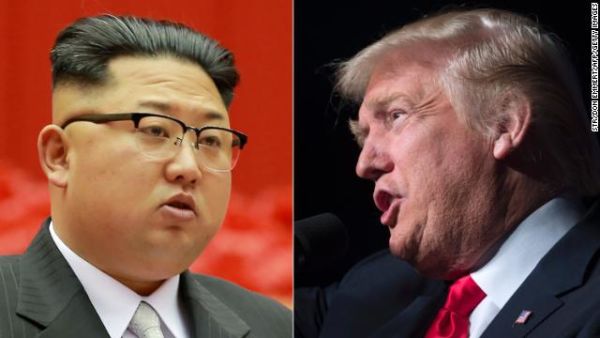
President Trump's meeting with North Korea's Kim Jong Un was first announced in March. Since then, it has been abruptly canceled — and just as abruptly put back on the calendar.
Here's a look at how the summit came to be:
- March 8: US officials say North Korea has invited President Trump to meet their leader Kim Jong Un. Trump agrees to the meeting and tweets, "Meeting being planned!"
- April: The US and North Korea hold secret, direct talks to prepare for a summit, several administration officials tell CNN.
- April 18: Trump confirms that then-CIA Director Mike Pompeo — who would later become secretary of state — visited North Korea and met with leader Kim Jong Un weeks earlier.

- May 10: Trump announces that the meeting is set for June 12 in Singapore, tweeting, "We will both try to make it a very special moment for World Peace!"
- May 24: Trump says he will not meet Kim, releasing a letter he sent the North Korean leader. In the letter, Trump warned North Korea that the US military is ready to act should Pyongyang take any "foolish and reckless" action.
- May 25: A day after cancelling the summit, Trump says he remains open to holding the meeting on June 12.
- May 30: Senior North Korean official Kim Yong Chol meets with US Secretary of State Pompeo in New York City.
- June 1: Chol travels to Washington, DC, and meets with President Trump. Their Oval Office meeting lasts for more than an hour, and Chol personally delivers a letter from Kim Jong Un himself.
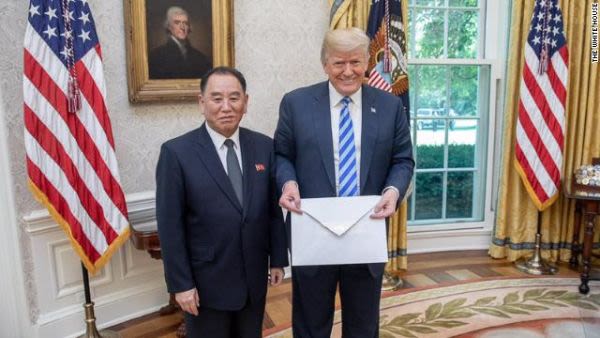
- Also on June 1: Moments after the meeting with Chol ends, Trump announces that the June 12 summit is back on.
7 hr 14 min ago
This is the hotel where Kim Jong Un and President Trump will meet
From CNN's Jeremy Diamond
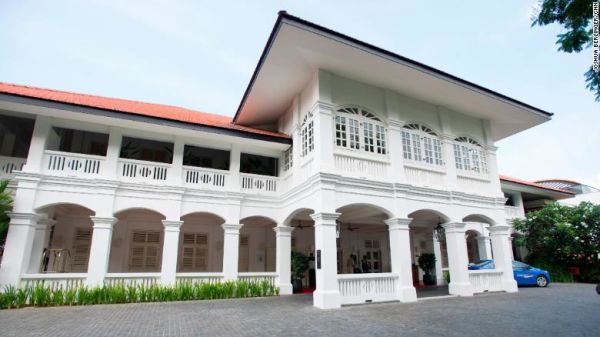
President Trump and North Korea's Kim Jong Un will meet for the first time at the Capella Hotel on Singapore's Sentosa Island.
Delegations from the US and North Korea met four times last week at the Capella Hotel to hash out the logistics of the summit, with setting an appropriate venue for the summit at the top of the agenda.
The red-shingled, colonial-style Capella is a five-star hotel on Sentosa Island, which boasts several resorts, hotels, two golf courses and a theme park.
The five-star luxury hotel, which has 112 rooms, is representative of the East-meets-West spirit so commonly associated with Singapore. Rooms look out onto the South China Sea, and peacocks can be seen on the property.
The realization has finally dawned that Donald Trump does not respond to reason
David A. Andelman, visiting scholar at the Center on National Security at Fordham Law School and director of its Red Lines Project, is a contributor to CNN where his columns won the 2017 Deadline Club Award for Best Opinion Writing. Author of "A Shattered Peace: Versailles 1919 and the Price We Pay Today," he was formerly a foreign correspondent for The New York Times and CBS News in Asia and Europe. Follow him on Twitter @DavidAndelman. The views expressed in this commentary are his own.
(CNN)From somewhere above 31,000 feet, heading to his North Korean summit in Singapore, Donald Trump pitched a hand grenade into this weekend's G-7 meeting of the world's leading democracies.
In a fit of pique over remarks by the G-7 host, Canadian Prime Minister Justin Trudeau, Trump reversed his decision to sign a closing communiqué carefully crafted by his six fellow members, tweeting from Air Force One, "I have instructed our U.S. Reps not to endorse the Communique as we look at Tariffs on automobiles flooding the U.S. Market!"
This last-minute reversal raises a dangerous question: How can Kim Jong Un trust that any agreement he makes with Trump would last beyond the setting of the next sun?
Of course, in Singapore, we will have perhaps the only two world leaders congenitally incapable of keeping any deal they've struck.
Still, G-7 2018 is in the books. The leaders of the other six leading democracies in attendance have now scattered to their homes. Yet the wounds Trump has left behind are deep and will not soon be forgotten.
So, what exactly happened along the idyllic shores of the Saint Lawrence River in a remote stretch of Quebec? The leaders of the developed world gathered for what promised from the outset to be a weekend of invective and calumny -- deepening conflict with Trump's America. Never mind that for much of the existence of this gathering, which dates back nearly a half a century, the United States served as the beacon of the world's leading democracies.
Outwardly, there were the usual smiles and handshakes, the first-name congeniality as the presidents, prime ministers and a chancellor assembled for their family photo and mugged for the cameras at photo-ops and preprandial gatherings. In the end, all seven thought they'd managed to paper over their differences with a joint communique signed by each country, including the United States.
But at his closing news conference, Trudeau suggested that he and others at the summit will hardly cave to Trump's tariff demands, adding that he found some of Trump's language "insulting" and that "we will not be pushed around."
On Sunday morning, Trump's chief economic adviser Larry Kudlow said on CNN's "State of the Union" that Trudeau's remarks were a "sophomoric political stunt." So to make sure, as Kudlow continued, that Trump did not "permit any show of weakness on the trip to negotiate with North Korea," the president retaliated in kind -- pulling a stunt that could backfire badly.
The big question: Are stunts the stuff of good diplomacy, or the way friends and allies should treat each other?
Indeed, the knives were not concealed very carefully at all. As Trump bolted to avoid the most uncomfortable moments of the gathering -- debate over global warming, which he utterly rejects -- he left behind a bad taste everywhere he turned.
Arriving late to the get-together, he missed his chance for a substantive meeting with French President Emmanuel Macron, who had been his one friend until a tense phone call earlier in the week. Then, he appeared late for the breakfast to discuss gender equality the next morning.
How could it possibly get any worse? Well, the President offered a few hints. He could, it seems, simply end all trade with any of their nations if they don't stop what he defines as unfair trade practices. Or he could continue to press for the pariah state of Russia, which Trump may not even have realized had been ousted after it seized control of Crimea from Ukraine, to return to the group.
Even today, Russia, still unrepentant for this action, would be the only autocracy in the G-8, with a GDP that ranks below every other member and indeed below non-members Brazil, India, China and South Korea.
If much of diplomacy is optics, President Trump seems to have left his opera glasses at home. Why would any world leader want to reward this kind of bad behavior by arriving at a quick trade deal that will only enshrine threats as the standard for accomplishing a purpose that should be the carefully considered outcome of discussion and diplomacy?
In one fashion or other, it seems, most of the other G-7 leaders have felt betrayed. All these leaders believe deeply in the natural order of things and the value of preserving a global club of democracies, while Trump believes -- and has never demonstrated more clearly than in Charlevoix -- in simply shredding such values at will and for his own convenience or profit. This weekend's G-7 simply placed all these feelings in greater, starker relief.
Ironically, it appears increasingly as though Trump is more comfortable and less threatened when dealing with autocrats or dictators: Welcome Putin back to the G-8; jet halfway around the world to spend some quality time with Kim Jong Un, a leader ruthless to all, even his own family.
The question, which must remain unanswered, is whether this weekend has left America a step closer to embracing or professing preference for autocracy itself. Certainly, with Trump leaving an empty chair Saturday afternoon as the G-7 discussed climate change, sustainable energy and renewable fuels, America has abdicated its onetime leadership position on these critical issues.
The realization has finally dawned that Donald Trump does not respond to rhetoric or reason -- or to anyone ganging up on him. The leading French daily Le Monde observed that the G-7 is simply "a symbol of a multilateral cooperation which he abhors." He does respond, however to strength and spine.
So, the battle was not joined in Charlevoix. But it will likely be joined in the weeks to come in retaliation, or at least with fortitude, as the G-6 unite against what now appears quite clearly to be their declared and sworn enemy.
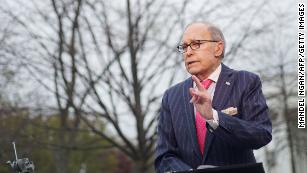
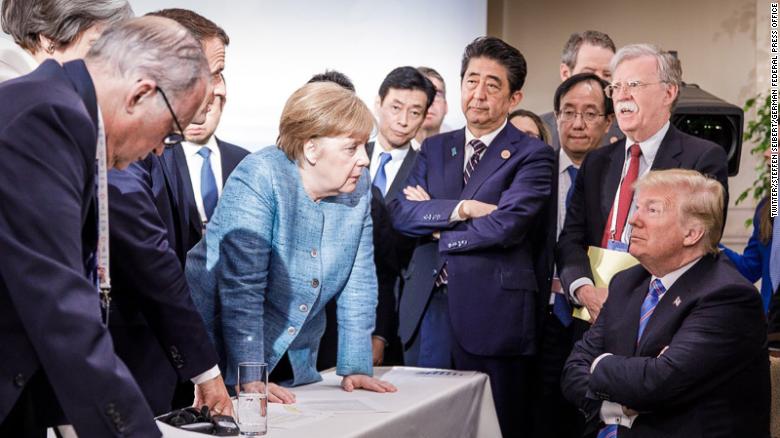
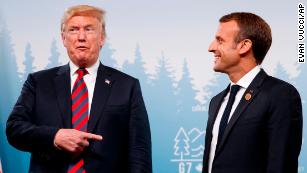
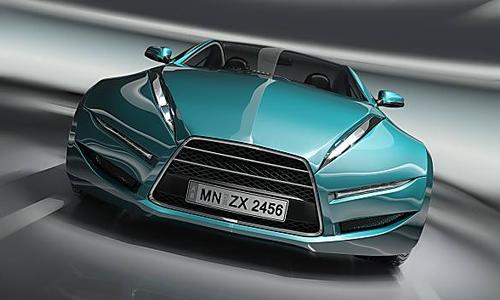
![[Gallery] What The Public Never Knew About Nancy Kerrigan [Gallery] What The Public Never Knew About Nancy Kerrigan](https://images.outbrainimg.com/transform/v3/eyJpdSI6ImNhOGRiMWYxYjhjZmRmYTM2NTRmOTAyYTY3NTU3ZjIzNjJkM2JkZjU3MjdlZmVjYWE4ZDFjNzU4YzgyYjYzNGMiLCJ3Ijo1MDAsImgiOjMwMCwiZCI6MS4wLCJjcyI6MCwiZiI6MH0.jpg)
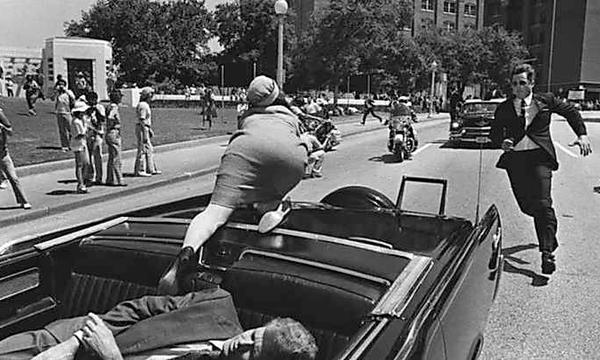
No comments:
Post a Comment